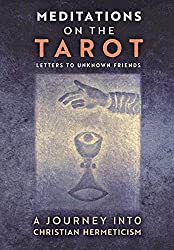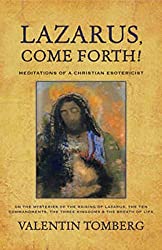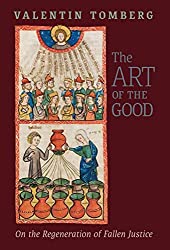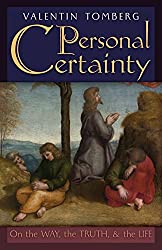We have recently published two lengthy pieces about Valentin Tomberg’s conversion from Rudolf Steiner’s Anthrosophy to Catholicism, wherein we also featured my own intense personal struggles of the past, when I deeply resonated with Anthroposophy.
Therein we suggested that many Anthroposophical folk – good folk, sincere and idealistic – often seem to struggle simply to hear what Tomberg writes about the Church.
Certainly, I had to! For far too long, I found it very difficult.
However, I could not forever ignore certain potent passages, particularly in Lazarus Come Forth, which Tomberg wrote in the aftermath of Vatican II.
Clearly, Tomberg was very disturbed by the course the Church was taking; the way to death he called it in one section.

And in other passages he clearly meant to supply a corrective.
Now, there is one very long, very dense passage with an extraordinarily long sentence conjoined by semi-colons. (I have reproduced it exactly in the graphic to the right.)
But here I thought it useful to break it down into bullet points. None of the words has been changed in what follows – I have only capitalised each statement where I added the bullet point.
This might seem overly-didactic, but I think it might help some folk to absorb what Tomberg writes, statement by statement.
As I say, I know from my past personal struggles how tough this can be . . .
Here is Tomberg, then, gravely concerned with what he call apostasy in the Church. (Recent developments in the Church make the following passage no less relevant today.)
- There are still people who have … unshakable security in the truth of the Christian revelation as transmitted and taught by the Church.
- They know the truth of the following: Extra Ecclesiam non est salus (“there is no salvation outside the Church”);
- The Holy Father is not and can not be the mouthpiece of an ecumenical council;
- The Holy See alone can make decisions in questions of faith and of morals – a majority of the bishops cannot do so, and even less can a majority of priests or congregations do so;
- The Church is hierarchic-theocratic, not democratic, aristocratic, or monarchic – and will be so in all future times;
- The Church is the Civitas Dei (“the City of God”) and not a superstructure of the will of people belonging to the Church;
- As little as the shepherd follows the will of the herd does the Holy Father of the Church merely carry out the collective will of his flock;
- The Shepherd of the Church is St. Peter, representing Christ;
- His pronouncements ex cathedra are infallible, and the power of the keys of the kingdom of heaven belongs to him, and him alone;
- In other words, those who become solitary in order to seek profundity may reach on their path of spiritual experience to the unshakable insight that the dogmas of the Church are absolutely true.
I will add little else, except that it is very, very, very hard for Anthroposophists to digest a sentence like:
‘The power of the keys of the kingdom of heaven belongs to [St. Peter, present in the Pope], and him alone [italics mine].’
If you are a Catholic reading these lines, dear Reader, perhaps you might be moved to say a prayer that the Anthroposophists who listen to Tomberg will likewise really listen to his words here . . ./

Buying Books at Amazon Through These Links Gives Us a Commission. This Supports Our Apostolate. Thank You if You Can Help Us Like This!





Comments
comments are currently closed
5 responses to “Valentin Tomberg on the Church – in Bullet Points”
[…] Whilst this book has nothing to do with fortune telling, my esteem for it may concern certain readers. (If you are such, I recommend that you read here and perhaps here.) […]
[…] « Valentin Tomberg’s Renunciation of Anthroposophy Valentin Tomberg on the Church – in Bullet Points » […]
An ideology very similar to ISIS. An unchallengable theocratic tyrrany.
[…] Charles Coulombe, I am indebted to you, along with the great Valentin Tomberg and Hilaire Belloc, for helping to set me free […]
[…] including the Russian Sophiologists, the Phenomenologists, Goethe, Boehme, Rudolf Steiner and Valentin Tomberg. This is not to say he endorses such figures wholesale, but rather welcomes profound insight, […]